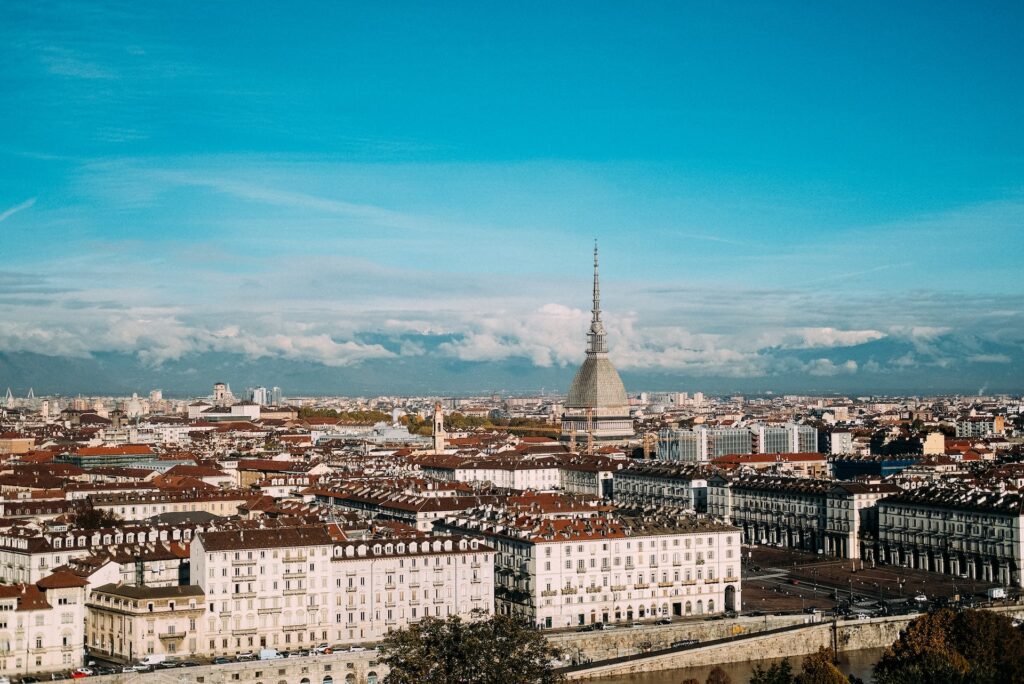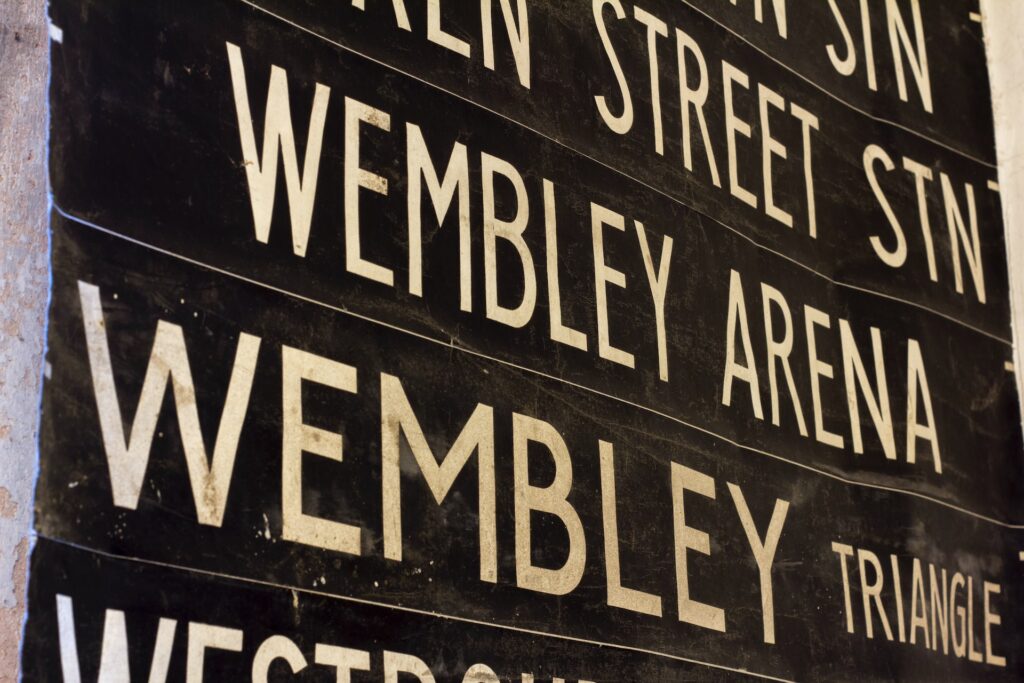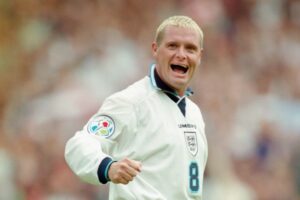The National Football Museum echoes the view of countless others when hailing Gazza as the most gifted English player of his era.
His creativity and flamboyancy belonged to a more modern era, so ahead of his time was he. Yet he had the tenacious physicality you’d expect from a northerner of his time, too; Gazza’s abilities were multifaceted, offering versatility to suit the dynamic world of soccer.
His career saw him don the shirts of Newcastle United, Tottenham Hotspur, Lazio, Rangers, Middlesbrough, and Everton, before making a handful of appearances for Burnley, Gansu Tianma, and Boston United in the twilight of his playing days.
With the arrival of the digital age and the subsequent scrutiny of every soccer star’s moves, we may never see the likes of Gazza again, and this is a tragedy for the sport. On the pitch, however, his abundance of talent inspired the generations which followed him. Here we’ll look back on a few of the bigger talking points surrounding the great man.
Tears in Turin

Truthfully, England stumbled their way to the semi-finals of World Cup 1990, having only won one game in regulation time. Yet they were just one round away from featuring in the tournament’s showpiece fixture. Next up: West Germany.
As yet another of England’s games went into extra time, Gascoigne attempted a slaloming dribble in the center of the pitch. He initially evaded two German tacklers, but the ball ran away from him. Clearly so eager to fight for every 50/50 and make amends for his sloppy touch, a rush of blood saw Gazza lunge into a late challenge on Thomas Berthold.
Gazza knew immediately that he could be in trouble, throwing his arms up in surrender after a poor tackle, hoping that the referee would take pity on the Englishman for acknowledging that his challenge wasn’t a good one.
While Berthold remained stricken on the ground, the referee brandished a yellow card. This, combined with the caution he received in the Round of 16 game against Belgium, meant that Gascoigne would be suspended for the final should England progress. Gazza couldn’t hold back his emotions, so they poured out on the biggest stage of them all.
We’ve all seen the slow-motion footage of Gary Lineker indicating to his coaching staff that his England teammate Paul Gascoigne is inconsolable. Yes, it was a bad tackle that probably warranted a yellow card, but it felt like an injustice to potentially miss the biggest game of your life for only your second bookable offense of the tournament.
The potential suspension turned out to be a moot point as a penalty shootout denied England its World Cup Final appearance.
Still, Gazza’s distress in Rome became a recurring illustration of all future national heartbreak, used motivationally to spur the next batch of stars onto glory. This success has so far evaded England. Gascoigne may as well have been crying for an entire country that knew their best chance at World Cup glory since 1966 had been drastically slashed with the suspension of one man.
That goal against Scotland

Delivering in the big moments when your country depends on you against your oldest foe, who is gaining momentum in a crucial match, will cement your legacy as a big-game player and a national icon.
England was a goal to the good on home soil during their Euro ‘96 group stage fixture with Scotland, but the opposition grew into the game, worrying the English with threatening chances.
It felt as though England’s barrier could be breached at any moment, relying on the spectacular acrobatics of goalkeeper David Seaman to bail them out of trouble, including a penalty save. England needed to press for that second goal which would surely finish off their rivals, deflating any hope of mounting a comeback.
When Darren Anderton weighted a first-time ball goalwards, it didn’t appear possible that Gazza would be able to forge a decent chance with his preferred right foot considering the angle of his run and the oncoming defender. Yet, such was his ingenuity, Gascoigne delicately lofted the ball over Scottish defender Colin Hendry in his stride, bewildering him into embarrassment in the process.
Now, all of a sudden, a promising pass turned into a glorious opportunity. Gazza, after sumptuously shifting the ball onto his stronger side and leaving Hendry flailing in his shadows, delivered a volley that would prove fatal for the Scottish. All the momentum they’d assembled had been destroyed in a single moment of artistic invention.
Any time an international tournament is approaching, whenever England’s greatest goals are debated, or if the topic regards Wembley’s most iconic moments, Gazza’s goal versus Scotland is, without doubt, going to be mentioned.
France ’98 omission
The press went into a frenzy when the news broke that Paul Gascoigne wouldn’t be a part of England’s World Cup squad in 1998. How could this once-in-a-generation entertainer, who featured so heavily during qualification, be left at home?
The answer was simple, or it was to then-manager Glenn Hoddle, at least. Gazza, on his 31st birthday, picked up an injury in a fixture against Morocco during the tournament’s build-up. Existing ailments had put doubts in Hoddle’s mind, but this latest development seemed conclusive.
Hoddle acknowledged that Gazza had well-documented issues in his personal life that needed to be monitored and felt his challenges to the star to work hard in an effort to build fitness went unheard, yet he was still considering his selection until the fateful friendly match made up his mind.
The manager wanted to bring Gascoigne and was devastated to leave him out. Claims that Gascoigne trashed the manager’s office in response to discovering his omission are untrue, says Hoddle (although he states that he did punch the door and might’ve broken his wrist!).
Gazza would never play for England again. Whatever your thoughts on the decision to omit him from the World Cup squad, being denied one last chance to see him in the national team’s jersey was a feeling of sorrow that many fans weren’t ready for.
Fighting demons
Paul Gascoigne’s personal issues are well documented. Images of a clearly unwell and troubled man being distributed through public channels were desperately sad and would’ve done nothing toward his rehabilitation and recovery.
The exploitative and insensitive tactics employed by many in the press during and after Gazza’s soccer career were shameful. Prominent media names admitted to disregarding Paul’s mental state throughout his ongoing ordeals.
As was the way when it came to Gazza, the tabloid media were circling vultures, scavenging scraps of contentiousness off of a flawed genius’ struggles. Even minor incidents, like the fictional trashing of Hoddle’s office, would spiral out of control to form widespread myths.
Just a boy living his dream
Before the days of 24-hour sports news, social media platforms documenting a player’s every public movement, and on-demand access to player interviews moments after a game’s conclusion, personalities in soccer were just that: personalities.
I won’t point the finger at anybody in particular, but it’s fair to say that most soccer players today are media trained, portraying neutrality at every turn to avoid anything that could be deemed controversial. Of course, this is understandable in the age of Twitter, where every move out of your home is broadcasted to millions in an instant, but it doesn’t change our yearning for originality.
Nobody could accuse Gazza of being dull. He was your every day Jack the lad, and this came through in his interviews. The excitable sounds and expressions emanating from his post-match euphoria were a joy to behold.
Despite injuries impeding Gazza’s playing time at Lazio, the fans in Rome still adore their cult hero, who entertained on and off the field. It’s hard to imagine a character with a less idiosyncratic zest for the eccentric being as revered as Gascoigne; such was his allure.
We love Paul Gascoigne because he could’ve been any of us; we all see a bit of ourselves in Gazza. Think back to the days of you and your friends kicking a ball around in the street, dreaming of expressing your soccer soul in front of thousands, savoring every moment that you’re fortunate to experience.
Soccer should be fun. It might feel ruthless and unforgiving sometimes, but ultimately we need to remember why any child meets their friends at the park for a kickabout. Some people paint, others sing, but for so many youngsters, soccer is a creative outlet.
This is why I love Gazza; because, to me at least, it was obvious that this was how he exhibited his artistic side, and the pitch was his canvas.

